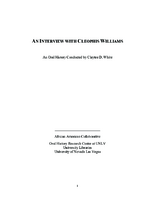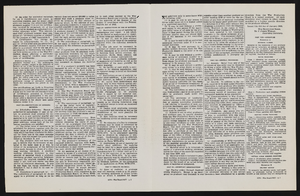Search the Special Collections and Archives Portal
Search Results

Transcript of interview with Frankie Perez by Elsa Lopez and Laurents Bañuelos-Benitez, November 5, 2018
Date
Archival Collection
Description
Frankie Perez (1986- ) is an individual that constantly found himself navigating two worlds, whether it was military versus civilian; female versus male; or being Latinx in the United States. As a result of this navigation, Perez has a unique perspective on our ever more complicated world that not many individuals possess. Perez served in the military during the Do Not Ask, Do Not Tell policy which made it difficult for someone dealing with gender identity, to seek out the proper support they need. Despite the policy, and other policies that were put in place afterwards to inhibit the transgender community in the military, Perez began his transition while still serving his country. In direct contradiction of popular opinion, Perez discovered that the military easily accommodated his transition. Outside of the military Perez is an active voice in the LGBTQ community. As a member of the LGBTQ, Latinx, and military community, Perez has a unique perspective that he uses to fight for both LGBTQ and Latinx rights. Currently, Perez is finishing his degree in gender and sexuality studies at UNLV. He hopes to use his education to help people have the difficult discussions and improve conditions for his communities.
Text

Transcript of interview with Jillian Hrushowy by Joyce Marshall, September 26, 1995
Date
Archival Collection
Description
Jillian Hrushowy arrived in Las Vegas in 1959 as part of a company hired to appear at the El Rancho Vegas Hotel in a production called La Nouvelle Eve. She has remained here (other than three short-term contracts in Reno, Nevada) until present day. She is now the production manager for Legends in Concert at the Imperial Palace Hotel. She was an only child, born in Rhodesia to English parents and raised in a home with servants and tutors. Her mother exposed her to the arts at an early age. Jillian took dancing lessons from the age of three years until she began dancing professionally. When she was fifteen years old, both parents agreed it was time for her to leave Rhodesia and finish her education in England. Living alone was difficult and lonely, but it afforded her a wealth of opportunities otherwise unavailable. She worked as a dancer in small, local productions while still in high school. When only eighteen, she got a job dancing in La Nouvelle Eve in Paris which eventually came to Las Vegas. This interview focuses on the years from Jillian’s arrival in 1959 until she retired from dancing in 1979. It follows her transitions from dancer, to principal dancer to production manager. [The first twenty minutes of the tape is warped and the text is garbled. The transcriber has lightly edited the transcript.]
Text

Transcript of interview with Midge Innis by James Thomas Griffin, May 8, 1976
Date
Archival Collection
Description
On May 8, 1976, James Thomas Griffin interviewed former casino dealer Midge Innis (born September 23rd, 1928 in Neligh, Nebraska) in her apartment in Las Vegas, Nevada about her life in Southern Nevada. The two discuss her occupational history as well as how she met her husband. The interview concludes Innis’ thoughts on environmental and social shifts in Las Vegas.
Text

Transcript of interview with Ivory Blue II by John Grygo, February 22, 2013
Date
Archival Collection
Description
Ivory H. Blue II was born and raised Las Vegas, specifically in the Westside neighborhood projects during the 1980s and 1990s. He describes his early childhood and what he remembers as a strong sense of community. Though grade school had its challenges, Ivory excelled in sciences and came under the watchful mentoring of Dr. Eugene McGaugh, a professor at UNLV. Ivory graduated with a master’s degree and has a long career already with NV Energy. Theresa Harris, Ivory’s mother, was from Hawthorne, Nevada and his father, Ivory Blue I, was originally from Edwards, Mississippi.
Text

Transcript of interview with Stephen Nasser by Barbara Tabach, January 17, 2018
Date
Archival Collection
Description
At the age of thirteen, the incredible life journey of Stephen “Pista” Nasser (b. 1931 - ) is preserved in his heart. His ordeal begins when his family are ripped from their home to be interred in a Nazi concentration camp in 1944. Fifty years later, he sits in his Las Vegas home and reflects on his calling to write and speak about his survival and losses. His ordeal is preserved in his book My Brother’s Voice (2013) and in his follow up stage production Not Now Pista. He is also the author of a companion memoir, Journey to Freedom. Stephen and his wife Francoise are tireless in their travels throughout the United States and the world. At the time of this 2018 oral history interview, Stephen had done over 1092 presentations about his harrowing life story to thousands of people of all ages and denominations. Each presentation fills a spot in his heart as he honors his brother and reminds listeners that such devastating episode in history should not be forgotten, and should never occur again. The timing of this interview also coincided with the premiere of a 20-minute documentary based on his writings and the play production. It was shown at the 2018 Las Vegas Jewish Film Festival. Note: the photo above of Stephen and Francoise Nasser was taken shortly after this interview on their next cruise. (2018)
Text

Transcript of interview with Eleazar "Al" Martinez by Marcela Rodriguez-Campo, October 2, 2018
Date
Archival Collection
Description
In his lifetime, Eleazar Martinez has climbed both literal and figurative mountains as an avid outdoorsman and social justice advocate for Latinx issues. Born in Sweetwater, Texas, Eleazar (Al for short) grew up connected to the land and his family. Al comes from a large family with strong ties in Texas and Mexico. His mother worked the fields and his father was a construction worker who instilled in their children the importance of a strong work ethic and the pursuit of an education. Al shares about growing up during a time when Spanish was banned from schools and children would get punished if they were caught using their home languages. His experiences developed his aspiration to serve his community and fight for people’s rights. After a short stint in the Navy, Al followed his instincts and sought out a college education and majored in sociology. His interest in social issues lead him to serve in a range of roles from psychiatric support, community education outreach, and counseling. At one point, Al even helped mediate tensions between gangs and law enforcement in order to prevent violence from erupting. Since arriving in Las Vegas in 1998, Al has been working alongside diverse communities to build solidarity. Today, he works as a supervisor for the Whitney Recreation Center and leader in Hispanics Enjoying Camping, Hunting, and the Outdoors (HECHO). As Al would describe himself, he is “a proud Mexican Latino American, a Tejano with a Chicano attitude”.
Text

Transcript of interview with Joseph Thiriot by Claytee White, August 10, 2000
Date
Archival Collection
Description
Joseph Thiriot is a longtime Las Vegas resident who served the community as an educator. He was born in 1906 in Provo, Utah; one of five sons bom to George W. and Elvira Thiriot. He has vivid memories of moving about, including living in Idaho where his father sold a typing machine , a forerunner to the typewriter. Eventually the family moved to a ranch in Pahranagat Valley, Nevada, where the limits of educational opportunities compelled his paients to send him back to Provo to finish his education while living with family there. Gaining a teaching certificate enabled Joseph to teach in rural Nevada. He completed his degree at the University of Utah and after meeting Las Vegas Superintendent Maude Frazier he relocated to Las Vegas to become a teacher. He reminisces about his life and the changes that have occurred over the years in Las Vegas.
Text

Transcript of interview with Cleophis Williams by Claytee White, April 27, 2010
Date
Archival Collection
Description
In 1943, Cleophis Hill Williams was a teenager visiting her mother who had moved to Las Vegas. For most of her young life she had lived with her parents in Muskogee, Oklahoma and Paul Spur/Douglas, Arizona. The same year that she visited Las Vegas, she met her future husband Tom Williams, with whom she had nine children, all born and raised on the Westside. Tom worked construction and built their first home on G Street. For Cleophis, she focused her life on raising her children and, whenever possible, finding some precious time to read.
Text

Transcript of interview with Fluff LeCoque by Joyce Marshall, May 5, 1997
Date
Archival Collection
Description
This interview is compiled in the bound book version for OH-02270. Born Ffolliott Chorlton in Butte, Montana in 1923, Fluff Le Coque embarked on a career during World War II that would span fifty-five years. Le Coque’s experience as an entertainer started at the age of seven when she began dance lessons during the Great Depression. She expanded her interest in show business at the University of Washington. Attending on a drama scholarship, she performed in theatrical productions and supplemented the scholarship by teaching coordination to university athletes through dance. Le Coque toured as a dancer in a road company during World War II. After the war she came to Las Vegas for the first time. Although she did not consider herself a singer, she performed as a vocalist with the Chuck Gould Orchestra at the Last Frontier. After a brief excursion to Hollywood, she returned to Las Vegas to work at the Thunderbird Hotel as a dancer. It was at the Thunderbird that she became part of the glamour publicity that would help shape the image of Las Vegas. Crowned “Miss Thunderbird,” Le Coque took part in publicity photo shoots designed to attract vacationing customers to the Las Vegas resort casino. While performing at the Thunderbird, Le Coque learned of an opportunity to showcase her talents in a wider arena. She joined a touring company that was preparing to take the production of Hollywood Extravangza to Europe. In Paris, Le Coque took on additional responsibilities in the production end of the business. She served the Hollywood Extravaganza as principal dancer, choreographer, and ballet mistress. On her return to New York, she firmed up her career-long relationship with producers Donn Arden and Ron Fletcher. Le Coque’s association with Arden-Fletcher Productions proved beneficial for an already successful career. She performed as principal dancer for Arden and Fletcher beginning with a six-month engagement at the Lookout House in Cincinnati, Ohio, in the late 1950s Arden wanted her to return to Las Vegas and she accepted immediately. The Las Vegas Desert Inn opened a newly remodeled showroom with Fluff Le Coque as a featured principal dancer. Arden-Fletcher Productions kept a number of performers busy throughout the United States from California to New York. Le Coque, now a valued talent, appeared in the Arden-Fletcher production at the Moulin Rouge in Hollywood. She worked there as company captain and principal dancer for ten years. Following her extended engagement at the Moulin Rouge, she toured the United States and Europe before returning to Las Vegas for good in the late 1960s. Arden again asked her to open a renovated showroom at the Desert Inn and again she agreed. This time Le Coque made Las Vegas her permanent home. She danced until she was forty-five years old and during the later years worked both sides of the stage, as company manager and dancer. Fluff Le Coque retired from dancing in 1970 to enjoy leisure activities and volunteer work. She learned to paint and served as publicity director of the Las Vegas Art Museum. She was wooed out of retirement by Donn Arden, to become company manager of the production show at the new MGM Grand Hotel [later reopened as Bally’s]. At the time of the interview, Le Coque continued to serve as company manager for Jubilee at Bally’s Hotel & Casino. Le Coque’s narrative provides a vivid account of the history of the Las Vegas entertainment industry. In addition to the organization of club circuits during the post-war years, the narrative provides clues about white-black relations during the era. It also informs a wider historical context. Post-war American society underwent significant changes economically, politically, and socially. Expanded work opportunities for women were among those changes. Le Coque’s choice to complete a college education during the 1940s was atypical. Her successful dancing career and later move into production management provides an example of career achievement decades ealier than the majority of American women. By extending her career as a dancer into her forty-fifth year, she resisted the evolving publicity hype that only an ingenue could be a dancer. Her narrative provides a compelling description of both the glamour and physical demands associated with the Las Vegas entertainment industry.
Text

